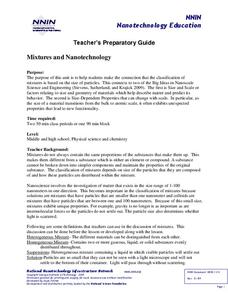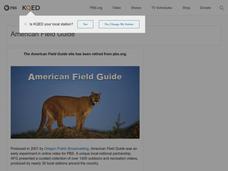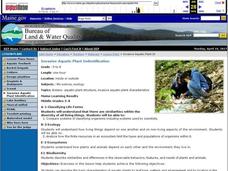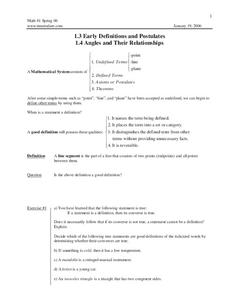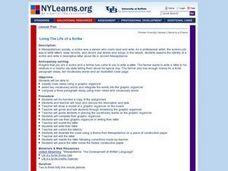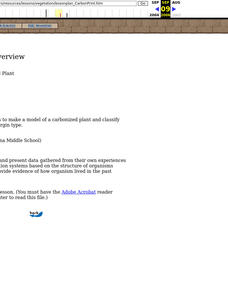CK-12 Foundation
Identification of Angles by Vertex and Ray
Angle ABC is not the same as angle BCA, but it is the same as angle CBA. Help your classes understand naming conventions of angles and, more importantly, the importance of naming angles correctly. Scholars practice the parts of the angle...
National Nanotechnology Infrastructure Network
Mixtures and Nanotechnology
What does size have to do with it? Learners analyze different mixtures, both homogeneous and heterogeneous, to discover the properties related to the size of their particles. The activity connects these properties to those of...
Curated OER
Classifying Organisms within Kingdoms
Students examine animal kingdom classifications. They discuss how animals are placed into kingdom classifications and compare similarities and differences of animals within a kingdom.
Curated OER
Flowers and Plants
Students are assigned to bring five flowers. They explore flowers to distinguish different physical features of flowers. They compare and contrast different flowers to determine what features they have in common. Students develop an...
Curated OER
Cells: Structures and Processes
Students explore the basic unit of life, the cell in this nine lessons unit. The cell structure of animal and plant cell functions and how they affect our world are probed in this unit.
Curated OER
Water Resource Engineering
Learners examine solubility and the significance of water. In this aqueous solution instructional activity students complete a lab activity on soil profiles.
Curated OER
Trees of our Forests
Young scholars use a field guide in order to identify trees. In this trees lesson plan, students classify the trees that they identify based on their relationships. Young scholars take a trip outdoors to look at trees.
Curated OER
Invasive Aquatic Plant Identification
Students observe aquatic plants and animals and identify their systems. In this plants and animals lesson plan, students compare systems of organisms and orally express how plants and animals rely on each other.
Curated OER
Ornithology and Real World Science
Double click that mouse because you just found an amazing lesson! This cross-curricular Ornithology lesson incorporates literature, writing, reading informational text, data collection, scientific inquiry, Internet research, art, and...
Mt. San Antonio Collage
Postulates, Angles, and Their Relationships
More than a worksheet, learners go through geometry topics example by example on the nicely organized handout. From postulates to classifying angles, there are rules and examples provided for each topic. The ten pages of problems provide...
Curated OER
Insects A-Z!
Alphabet insects! Who has ever heard of such a thing? Get ready because your class is going to research insects that start with a specific letter of the alphabet. In small groups, they'll use the Internet and reference texts to locate...
Curated OER
Living The Life of a Scribe
Students write a descriptive letter about life in ancient Mesopotamia. Through video streaming, students discover the history of Mesopotamia. They assume the role of a scribe and compose a three paragraph essay using main ideas and...
University of Hawaiʻi
Taxonomy and Me!
Taxonomy is the study of organisms and how you phylum. Three biology activities are included, helping scholars understand four of the six kingdoms, specifically Protista, Plantae, Fungi, and Animalia. Scholars observe and classify in...
NOAA
Plankton
Dive into the world of plankton. The 17th installment of a 23-part NOAA Enrichment in Marine sciences and Oceanography (NEMO) program introduces different types of plankton. Young scientists then use what they have learned to classify...
Curated OER
Freshwater Fish Anatomy & Taxonomy
Tenth graders use a classification key to identify organisms. In this classification lesson students identify freshwater species of fish and document their observations.
Curated OER
"Fossil" of a Carbonized Plant
Students use leaves to make model of a carbonized plant and classify leaves by shape and margin type.
Virginia Department of Education
Animal Phyla and Plant Divisions
Searched hours for an activity that allows individuals the ability to use multiple resources to learn about both plant and animal kingdoms? This discussion and activity provide pupils with the ability to visualize each organism before...
Curated OER
Structure and Function of the Cell/Introduction to the Cell
So, this is not technically a learning exercise, but rather a chapter of reading material, pictures, and diagrams introducing young biologists to the cell. Cell theory, diversity, size, and shape are described. The internal organization...
Curated OER
Bering Sea Buffet - A Foodweb Activity
Life in the Bering Sea, food webs, and the ocean ecosystem are introduced with a map activity. The lesson starts as kids explore maps and images of the Bering Sea, then it kicks into high gear as they start to discuss the types of...
Novelinks
The Little Prince: Blooms’ Taxonomy Questions
Question what you read with a lesson based on Bloom's Taxonomy. As kids read The Little Prince by Antoine de Saint-Exupéry, they formulate questions with cues from a graphic organizer, and answer them to work on critical thinking skills.
Virginia Department of Education
World History and Geography to 1500 A.D.
Here's a great resource for your curriculum library. The 240-page packet, organized into units by topics, includes sample lesson plans, links to primary and secondary source documents, worksheets, activities, and sample assessments.
Curated OER
Interactions of Living Things
Is it a producer, carnivore, omnivore, scavenger, or decomposer? Different relationships among organisms are explored here. It is a simple, multiple choice assignment. Use it as a quick warm-up or quiz.
Curated OER
Reading Primary Source Documents: Historical Content
Why do we read primary source documents? What can they give us that other writings cannot? Provide your learners with any of the primary sources attached here (there are seven), and have them complete the graphic organizer (which opens...
Curated OER
The Five Classes of Vertebrates
What a terrific lesson! Learners discuss the animal kingdom, and classify them as vertebrates and invertebrates. They also identify them as fish, amphibians, reptiles, birds, and mammals. There is even a taxonomic breakdown of popular...



